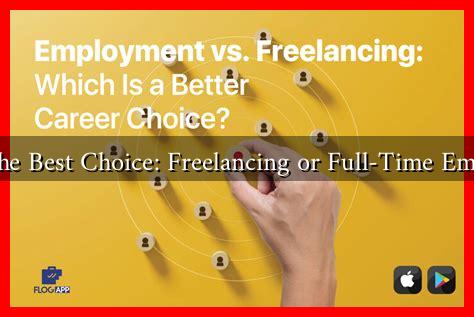-
Table of Contents
- What Is the Best Choice: Freelancing or Full-Time Employment?
- Understanding Freelancing
- Advantages of Freelancing
- Challenges of Freelancing
- The Case for Full-Time Employment
- Advantages of Full-Time Employment
- Challenges of Full-Time Employment
- Statistics and Trends
- Making the Right Choice for You
- Conclusion
What Is the Best Choice: Freelancing or Full-Time Employment?
In today’s dynamic job market, professionals are increasingly faced with the choice between freelancing and full-time employment. Each option comes with its own set of advantages and challenges, making the decision a complex one. This article aims to explore both paths, providing insights to help you determine which might be the best fit for your career aspirations and lifestyle.
Understanding Freelancing
Freelancing refers to working independently, often on a project basis, for various clients rather than being tied to a single employer. This model has gained popularity, especially with the rise of digital platforms that connect freelancers with clients.
Advantages of Freelancing
- Flexibility: Freelancers can choose their working hours and locations, allowing for a better work-life balance.
- Diverse Opportunities: Freelancers often work on a variety of projects, which can enhance their skills and keep work interesting.
- Potential for Higher Earnings: Successful freelancers can set their rates and may earn more than they would in a salaried position.
Challenges of Freelancing
- Income Instability: Freelancers may experience fluctuations in income, making financial planning more challenging.
- Self-Employment Taxes: Freelancers are responsible for their taxes, which can be more complicated than traditional employment.
- Lack of Benefits: Freelancers typically do not receive health insurance, retirement plans, or paid time off.
The Case for Full-Time Employment
Full-time employment involves working for a single employer, usually with a set salary and benefits. This traditional model has been the norm for decades and continues to be a popular choice for many.
Advantages of Full-Time Employment
- Job Security: Full-time positions often provide a sense of stability and predictability in income.
- Benefits: Employees typically receive health insurance, retirement contributions, and paid leave, which can significantly enhance overall compensation.
- Career Development: Many companies offer training and advancement opportunities, which can lead to long-term career growth.
Challenges of Full-Time Employment
- Limited Flexibility: Full-time employees often have fixed schedules and may need to adhere to office policies.
- Work-Life Balance: The demands of a full-time job can sometimes encroach on personal time, leading to burnout.
- Less Variety: Employees may find themselves working on similar tasks, which can lead to monotony.
Statistics and Trends
According to a report by Upwork, 36% of the U.S. workforce is freelancing, a number that has been steadily increasing over the years. This trend indicates a shift in how people view work, with many prioritizing flexibility and autonomy over traditional job security.
Conversely, a survey by the Bureau of Labor Statistics shows that full-time employment remains a stable choice for many, particularly in industries that offer robust benefits and career advancement opportunities.
Making the Right Choice for You
Ultimately, the decision between freelancing and full-time employment depends on individual circumstances, career goals, and personal preferences. Here are some questions to consider:
- What is your financial situation? Can you handle income fluctuations?
- Do you value flexibility over stability?
- What are your long-term career goals? Do you seek advancement or diverse experiences?
Conclusion
Both freelancing and full-time employment offer unique benefits and challenges. Freelancing provides flexibility and the potential for higher earnings, while full-time employment offers stability and benefits. By carefully considering your personal and professional goals, you can make an informed decision that aligns with your lifestyle and aspirations. Whether you choose to freelance or pursue a full-time position, understanding the landscape of work today will empower you to navigate your career path successfully.

